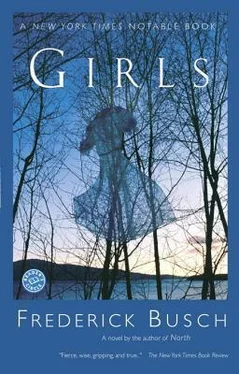We asked each other what we were doing wrong. We worried together that she suffered, that she felt forsaken, that she needed help we didn’t provide. Fanny had refused to go to work, so I stayed home that day as well, and we took turns walking around the house with our baby held against our shoulders and chests. We sang low to her and once in a while she slept. She didn’t eat very well, and her face felt hot by evening. Her dark eyes watched us. Her skin and hair smelled oily instead of perfumed.
“We take her to the doctor now.”
“I can’t go back again, Jack. It’s like I’m this shit mother who can’t take care of her kid.”
“No,” I told her, “you’re a great mother. You do everything, Fanny. You’re fabulous. It’s just, she’s sick. Let’s take her to the doctor.”
“If she’s like this in the morning, all right? I don’t know,” she said. “Maybe you’re right. Maybe she is sick. But the way she’s been, what in hell does sick mean? You know? She’s as bitchy as I am, isn’t she?”
“This has nothing to do with you, Fanny.”
“Pardon? Nothing to do with me? Were we talking about my child, or did we have a conversation in Urdu about a baby on the other side of the world? Can you remember which, Jack?”
“I meant it wasn’t your fault. I meant you shouldn’t take it, you know, personally.”
“I thought I heard you right,” she said.
“What’d I say ?”
“Give my baby to me, please.”
“Fanny.”
“Now, please.”
I handed her over. I always remember that. I handed her over. Fanny took her up to bed to try it again. We were very tired and very worried, and it was probably what we should have done, Archie Halpern told me. When he said it, his round sweaty face tightened down and I thought he was going to start crying. He really wanted me to believe him. I remember I handed her over and then she went, in Fanny’s arms, upstairs. It was night, but with a brightness in it — I suppose it was the moon. The mixture of light and dark was the same as now, when the dean of faculty was telling the Secret Service about the dilemma and the Secret Service was telling the head librarian that canceling the visit was not going to keep her from doing federal time and Professor Piri asked if there was anything I could suggest as our child went up the stairs.
I begged their pardon and asked them what they meant.
Piri asked if I could suggest a way out.
“There isn’t one,” I told them.
The dean and the head librarian looked like they knew I’d be useless and, there, I was.
Piri shrugged.
There isn’t one.
And the same light as I slept under in our morris chair, falling selfishly asleep while Fanny, also burnt down and stubbed out with worry and fatigue, was upstairs with our child. I heard her snarling without words while the baby cried the same weak, tired cycle of noises over and over, Fanny crying back in what I guess you’d call frustration and the kind of anger it creates. Both of them, now, over and over, and then a new sound to the sounds, a terrible new violence. That was my specialty. I knew this. Now I heard it in our house, upstairs, and before I made a decision, I was moving out of the chair in the same light, the same sealed-in dimness, like the far-off glare of a hurricane, except inside our house.
I went up the stairs, calling to them. Their voices were blended in the rage — it was dogs snarling, except the real dog was behind me, coining up the stairs — and I went around the corner of the hallway and then I was down the hallway in three long steps and I went from the hallway into the room, our baby’s room.
I went into our dead baby’s room.
Then we were on our feet in the library. People discussed the irony of information sealed away in a campus building dedicated to disclosure. The Secret Service agents could not be consoled. Warnings were made and a meeting scheduled for the next day. One of the agents described it as the last. Piri said something about the right to privacy. She smiled at me shyly and I remembered how she’d told me her father was a New York cop.
And in the Jeep, driving up the campus road in second gear because, I guess, I forgot to shift into third until I heard the gearbox nagging, I thought of how in this part of the country, they keep the corpses all winter long. They don’t get into the ground until April. Plants begin to bloom, and so do the graves. The frost line is high, but in April they get through the lingering snow and the iron surface of the ground by using a backhoe. Then they bury the dead. I shifted up to third, but on too steep an angle, and the engine bucked, so I downshifted and made my way very slowly to the top of the campus. I went up past the old graveyard filled with dead professors, toward the quarry where the redheaded girl had tried to kill herself. I wanted to be alone under the low, dirty clouds of the darkening day, and I was, when I turned the engine off and put both hands at the top of the wheel and leaned my forehead onto them. I must be a very bad and selfish man, I thought. I must have loved Fanny more than our child, our baby girl we had named Hannah, who was dead and under the snow.
WHEN I CAME HOME, Fanny was at work, of course. I nevertheless called to the house that I was there. The dog, who had been up with his forepaws on the inside of the door, already knew that. I let him out, and I walked with him a little. Our road had three-foot snowbanks, and he occasionally jumped up onto them and lifted his face into the winds and then clambered down. He made a series of notches in the snow that hemmed us in as we went about a half a mile up the road and then walked home. I stopped below an evergreen that had turned skeletal and brown. I hoped it was a tamarack tree. I thought they were the kind of evergreen that goes through seasonal cycles and in the spring comes back tender and green. I looked at mouse trails in the snowbanks, and rabbit tracks. I thought how much was going on when I didn’t see.
“It’s a kind of natural history lesson for the optimism-impaired,” I told the dog. He seemed pleased to be addressed and, both of us steaming at the muzzle, we went home.
I turned lights on. After the meeting in the library, I wanted brightness, room to room. For company, I turned the TV set on and let a smooth fellow with a nasal hum tell the house about weather in Colorado and Wyoming. Upstairs, I turned on the hallway light. I forced myself to move with no hesitation when I went into the baby’s room.
She had cleaned it. She had used a shovel and a garbage pail for the burnt, shredded wallpaper. They were still in the room, the square-ended shovel with its wooden handle inside the metal pail. They looked like a big mortar and pestle in the window of an old-fashioned pharmacy. She had put the smaller pieces of Sheetrock and large dried piles of joint compound into the pail along with some of the smaller splintered chunks of stud. The rest, I thought, she must have carried down to the garage. Near the pail was a dustpan and a straw broom she had used to sweep the floor.
It looked like any room in process, a room in a house that someone was going to redecorate. Maybe we can do that, I thought. Maybe it would be good for us to look at wallpaper and paint. We’ll buy a gallon of flat ceiling white, I thought. And some new rollers, and a low-luster oil-based paint for the windows and molding and doors. We’ll take home paint chips and hold them up to the wall, and we’ll talk about colors.
I looked at the quarter-round molding I might replace with something a little more ornate. I was good at mitering cuts of forty-five degrees. I might box in the windows with four-inch casing, I thought. The dog had a length of splintered stud, and he chewed it, shaking it in his teeth once or twice in case it was alive. I kept my back to the corner of the room in which we had stood Hannah’s crib.
Читать дальше










